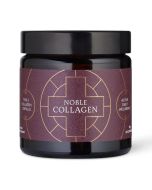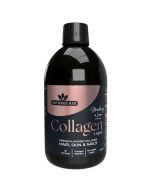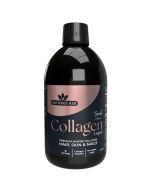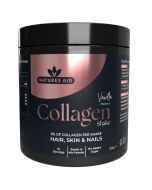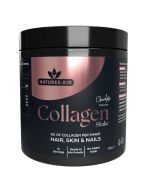
Everything You Need to Know About Collagen and Skincare: FAQs Answered
Collagen skincare and supplements are all the rage right now. You may have seen collagen supplements being sold in health food stores, or collagen skin creams being advertised online. But what is collagen, exactly? And what does it do for your skin? In this article, we will answer all of your questions about collagen and skin health!
What Does Collagen Do & Why Is It Important For Healthy Skin?
Collagen is a protein that occurs naturally in our bodies. It helps to keep our skin looking firm and youthful by providing structure and support to the connective tissue of our bodies.
As we age, collagen production slows down, which can lead to wrinkles and sagging skin. This reduction in skin elasticity isn't a skin health issue but some people prefer to try and reduce the signs of skin ageing if they can.
Where collagen levels can affect our health is within the body, either due to issues with collagen synthesis (creating collagen) or scleroderma (too much collagen). Oral collagen supplements can help with the former, while prescription medication can help with the latter.
Is Collagen Treatment Good For Skin?
Yes! Collagen treatments, be it a collagen supplement or moisturiser, can help to replenish the collagen in our epidermis and increase collagen production.
Collagen treatments typically mean applying amino acids, namely collagen peptides, to the skin or body. Collagen peptides can help to build revitalising collagen fibres in our skin and joints.
Collagen treatments can help to improve skin elasticity, and reduce the appearance of wrinkles, fine lines, and other signs of ageing.
Is Collagen Good For Skin Problems?
Yes, collagen can be helpful for treating various skin problems. For example, collagen can help to reduce the appearance of scars and stretch marks. It can also help to improve the appearance of sun-damaged or dehydrated skin.
Can Collagen Cause Skin Issues?
No, collagen is not known to cause any skin problems. In fact, collagen is often used as a treatment for various skin issues, such as wrinkles, fine lines, and scarring.
How Do You Know If Your Skin Is Lacking Collagen?
If your skin looks thin, wrinkled, or saggy, it may be lacking in collagen. A simple collagen test can be done by a dermatologist to determine if your skin is deficient in collagen.
Is It Good To Take Collagen Every Day?
Yes, collagen is a protein that is essential for our bodies. Taking collagen every day can help to improve the appearance of your skin, hair, nails, and joints. It can also help to boost collagen production in your body, which will result in healthier, more youthful-looking skin over time.
Can Collagen Cause Itchy Skin?
No, collagen is not known to cause itchy skin. In fact, collagen can actually help to soothe itchiness and inflammation. If you have itchy skin, you should see a dermatologist to determine the underlying cause.
Which Foods Are High In Collagen?
There are many foods that are high in collagen, such as bone broth, chicken, fish, and leafy green vegetables. You can also get collagen from supplements, which are available in health food stores or online.
Does Caffeine Affect Collagen?
Caffeine does not directly affect collagen. However, it can cause dehydration, which can lead to dryness and wrinkles. If you want to avoid the effects of caffeine on your skin, you should limit your intake of coffee, tea, and energy drinks.
Who Should Not Take Collagen Peptides?
People with allergies to fish or shellfish should not take collagen peptides. Collagen is typically derived from these animals. People with other allergies may also be allergic to collagen peptides. It is always best to speak with a doctor before taking any new supplement.
What Are The Side Effects Of Taking Collagen Peptides?
The most common side effect of taking collagen peptides is gastrointestinal distress, such as bloating, gas, and diarrhoea. If you experience these symptoms, you should stop taking collagen peptides and speak with a doctor.
Can Too Much Collagen Cause Breakouts?
No, collagen cannot cause breakouts. In fact, collagen can actually help to improve the appearance of your skin by reducing inflammation and stimulating cell turnover. If you are experiencing breakouts, you should see a dermatologist to determine the underlying cause.
How Do I Know If I'm Allergic To Collagen?
If you have an allergy to fish or shellfish, you may also be allergic to collagen. Collagen is typically derived from these animals. If you experience any allergic symptoms, such as hives, swelling, or difficulty breathing, you should stop taking collagen and see a doctor immediately.
Can Collagen Cause Rosacea?
No, collagen cannot cause rosacea. However, people with rosacea may be more likely to experience allergic reactions to collagen peptides. If you have rosacea and want to take collagen peptides, you should speak with a doctor first.
Are Collagen Supplements & Skincare Products Recommended?
Skincare products can help to replenish the collagen in our bodies giving us back firmer, younger-looking skin. There are many collagen skincare products on the market that can help to improve the appearance of our skin by replenishing the collagen that we've lost over time. These products come in the form of creams, serums, powders, and even supplements.
By Girish Desai, Pharmacist (GPhC ), Nutritionist and Homeopath
Disclaimer
The products offered are not intended to diagnose, treat, cure, or prevent any illness or disease, or replace the advice of a medical professional. Results are not guaranteed and may vary from individual to individual.




